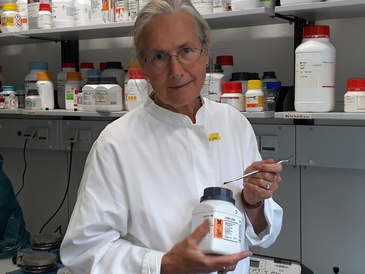“The widespread use of pesticides has resulted in a dramatic decline in biodiversity,” says the Bremen biologist. “Especially the health of soil is given too little attention worldwide – even though about 95 percent of the food we consume comes from soils.” A large proportion of crop protection products end up on and in the soil – often with frightening consequences. For example, the long-term use of copper-bearing fungicides leads to the virtual eradication of earthworms. “Agricultural production must be seen holistically and, above all, in the long term,” she says.
Approval process does not sufficiently reflect the impact
Juliane Filser is a member of a group of experts who convened at the invitation of the National Academy of Sciences Leopoldina. Together with other authors, Filser vividly shows that the current authorization procedures for pesticides fail to reflect many of the environmental effects on agricultural land. The expert group recommends adapting the authorization procedures for pesticides in order to make their use more environmentally friendly. Based on the example of the weedkiller glyphosate and the pesticide group of neonicotinoids, they illustrate, for example, the deficits in the authorization procedures and make recommendations on how they could be improved.
Expert group calls for observation system
According to Filser, “Crop protection products are often longer detectable in soil and water than intended under the authorization. Even after they have become degraded, they can still have delayed effects.” Together with the expert group, she is therefore proposing a system of observation that will examine the long-term effects of pesticides on ecosystems. They also recommend a phased authorization process over an initially limited period and area of use.
Ecosystems are exposed to a pesticide cocktail
In agricultural practice, several pesticides are spread over the fields by means of tank mixes in spraying sequences. As a result, ecosystems are mainly exposed to mixtures of pesticides. According to the expert group, though, so far there has been very little research on precisely how these mixtures impact on the environment. They therefore recommend taking greater account of agricultural practice and the real environmental situation in the risk assessment. The risk assessment already looks at how pesticides affect so-called non-target organisms. These are the plants and animals to which the pesticide is not directly applied, but which can be affected by its spread in the soil and water. The experts also recommend that this aspect should receive more attention than is currently the case.
New process offers advantages for pesticide industry
“The phased authorization process we are proposing would also have benefits for the crop protection industry,” says Juliane Filser. As a result, substances that pose no risk to health or the environment could be applied earlier under field conditions, with the consequence that the entire process would be shortened and the associated costs significantly reduced.
More information under:
https://www.leopoldina.org/publikationen/detailansicht/publication/der-stumme-fruehling-zur-notwendigkeit-eines-umweltvertraeglichen-pflanzenschutzes-2018/
www.uni-bremen.de
Members of the press please note: Professor Juliane Filser is available for interviews. You can find her photo under the following link and you are welcome to use it with due mention of copyright: https://seafile.zfn.uni-bremen.de/d/203ce7cfa9494df39d71/?dl=1 .
If you would like to know more about this topic, feel free to contact:
Prof. Dr. Juliane Filser
General and Theoretical Ecology
Faculty of Biology / Chemistry
University of Bremen
Phone: +49 421 218-63470
Email: filserprotect me ?!uni-bremenprotect me ?!.de


![[Translate to English:] [Translate to English:]](/fileadmin/_processed_/b/a/csm_2018_06_19_Pflanzenschutz_Filser_Quelle_Juergen_Warrelmann_Universitaet_Bremen_8132bf7593.jpg)